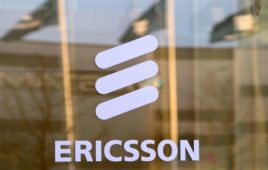LONDON (AP) — British officials downplayed reports that Prime Minister Theresa May will allow China’s Huawei to supply parts of the U.K.’s new internet network, a decision that goes against U.S. pleas to ban the firm as it could help Beijing’s spying efforts.
British media reported Wednesday that the government will let Huawei work on “non-core” parts of the 5G network, such as antennas, as the country adopts the next generation technology that will provide faster service and connect a broader array of devices to the internet.
The decision by the National Security Council was first reported by the Daily Telegraph, which didn’t provide a source for the information.
Margot James, the government minister for digital and creative industries, said in a tweet that the government hasn’t made a final decision, “despite Cabinet leaks to the contrary.”
Ciaran Martin, head of the National Cyber Security Centre, said at a security conference in Glasgow that the government would announce the decision as part of a larger package of measures designed to ensure the 5G network is as secure as possible.
“There’s a lot more to 5G security than just whether particular companies get particular contracts,” he said. “There’s a whole framework of improvement we need to make.”
The United States has been lobbying allies like Britain to exclude Huawei from all 5G networks, noting that the Chinese government can force the company to give it backdoor access to the data on its networks.
Huawei officials have denied that the company is a security risk, saying that they have no links to the Chinese government and operate like any other international company.
But a key U.K. lawmaker said that allowing Huawei to be involved would increase the risk of cyber espionage by China.
Tom Tugendhat, chairman of Parliament’s foreign affairs committee, told the BBC that it is very difficult to separate core and non-core components of the 5G network because the technology represents an “exponential increase” in speed and capability.
Tugendhat said that while he doesn’t doubt the integrity of Huawei officials, they are still bound by Chinese law.
“This does mean that it is unwise to cooperate on an area of critical national infrastructure, like telecoms, with a state that can best be described as not always friendly,” he said.

